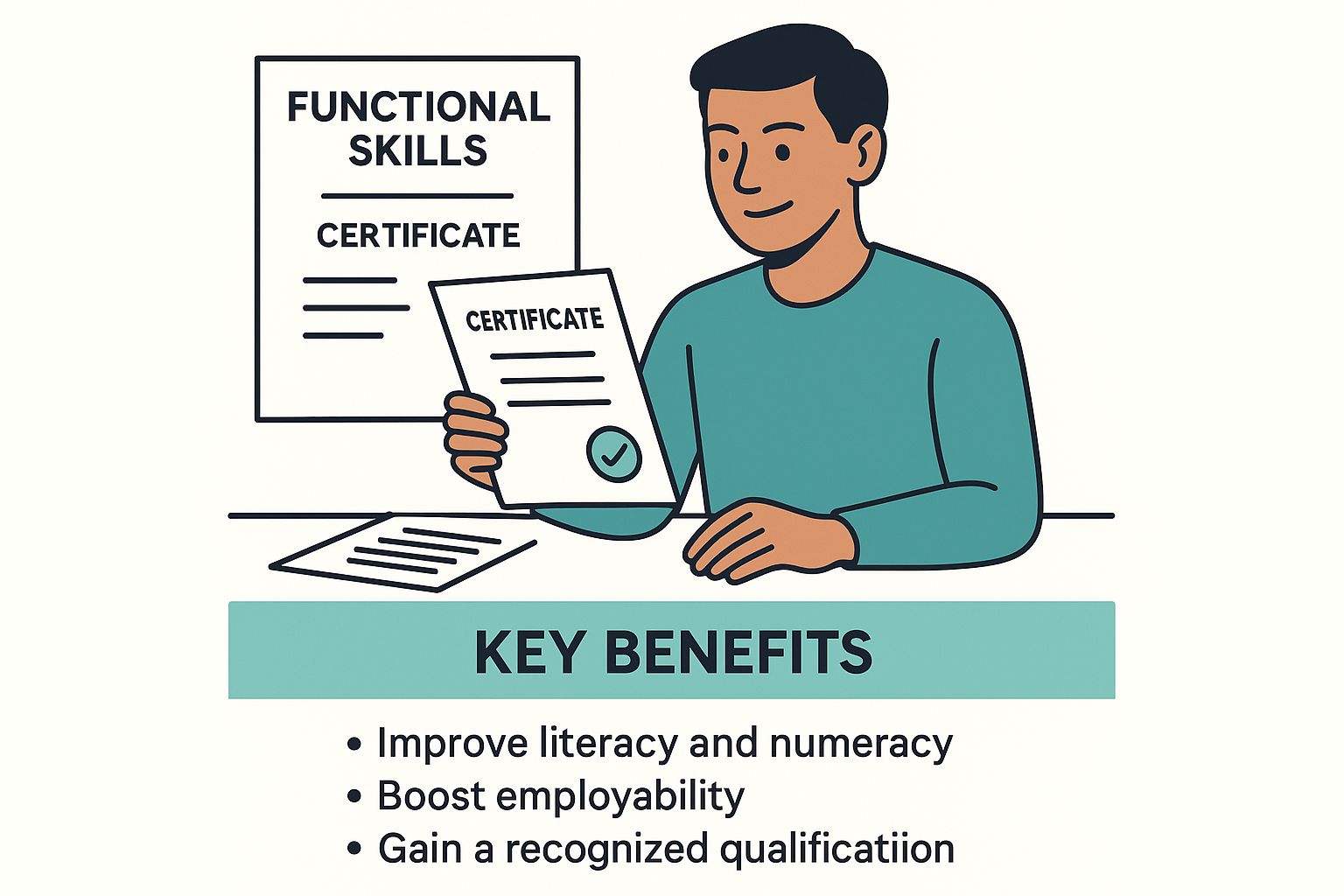
Ever felt that some qualifications aren't quite in sync with the real world? If so, you're not alone. This is exactly why Functional Skills were created. They are practical qualifications in English, maths, and ICT (Information and Communication Technology) designed to give you the essential, everyday skills you actually need for work, study, and life.
In this guide, you'll discover what Functional Skills are, how they compare to GCSEs, and why employers value them so highly. Ready to find out if they're the right next step for you? Let's dive in.
So, What Exactly Are Functional Skills?
Think of Functional Skills as your personal toolkit for navigating adult life. The maths qualification isn't about abstract algebra; it’s the practical know-how you need to manage a household budget or figure out a 25% off sale. The English qualification won’t have you analysing old poetry; it’s about crafting a clear, professional email that gets results.
These qualifications were specifically developed to bridge the gap between classroom theory and the practical skills demanded in the workplace.

Unlike traditional exams that test your memory, Functional Skills are all about application. You won't be asked to solve a random maths problem. Instead, you might be tasked with calculating the area of a room to see if a new carpet will fit. It's this hands-on, practical approach that makes them so relevant.
They’re widely recognised by employers and educational institutions across the UK. In fact, following some key improvements, the 2022 to 2023 academic year saw a 9% increase in certificates being awarded. This shows just how many people are turning to Functional Skills to prove they have the abilities that matter. You can explore the data yourself by reading the UK government's annual report.
How Do Functional Skills Compare To GCSEs?
One of the most common questions people ask is how Functional Skills stack up against GCSEs. While both are valuable and respected qualifications, they are designed for slightly different purposes.
-
GCSEs offer a broad, academic grounding in a subject, often focusing on theory.
-
Functional Skills are laser-focused on certifying your competence in core practical skills.
So, which one is right for you? It all comes down to your personal goals.
Functional Skills vs GCSEs At a Glance
This table provides a clear comparison between Functional Skills Qualifications and GCSEs to help you decide which is more suitable for your goals.
|
Feature |
Functional Skills Qualifications |
GCSEs |
|---|---|---|
|
Main Focus |
Practical, real-world application of skills. |
Broad academic and theoretical knowledge. |
|
Assessment |
Task-based assessments and controlled tests. |
Primarily exam-based, often at the end of the course. |
|
Timescale |
Can often be completed quickly, in weeks or months. |
Typically studied over one to two years. |
|
Best For |
Adult learners, career changers, meeting apprenticeship requirements. |
School leavers, progression to A-Levels and university. |
Ultimately, the choice depends entirely on what you want to achieve next.
The key takeaway is this: A Functional Skills qualification is direct proof to an employer that you can walk into a job on day one and apply your skills to solve real problems.
This makes them a fantastic alternative (or even a top-up) to GCSEs, especially if you need to:
-
Gain a recognised qualification quickly for a new job or promotion.
-
Meet the entry requirements for an apprenticeship, college course, or university.
-
Build confidence in subjects you found challenging at school.
Understanding the Different Levels of Functional Skills
Functional Skills qualifications aren't one-size-fits-all. They are designed to meet you exactly where you are on your learning journey. Think of the levels as a ladder – you can start on the right rung for you and climb towards your goals at your own pace. This structure is fantastic for building confidence step by step.
The qualifications are broken down into five distinct levels, starting with the very basics and moving up to more advanced skills.
Entry Level Qualifications
This is the perfect starting point if you need to build a solid foundation. Perhaps you found Maths or English tricky at school, or you’ve been out of education for a while. If so, the Entry Level is for you.
It's split into three manageable stages:
-
Entry Level 1: Covers the absolute fundamentals, like recognising simple words or doing basic addition.
-
Entry Level 2: Builds on the first stage, tackling slightly more complex tasks like writing short sentences or working with money.
-
Entry Level 3: Gets you ready for the next big step. You’ll work on skills like writing more complex sentences and solving practical, multi-step maths problems.
This infographic gives you a great visual of how you progress and what you gain along the way.

As you can see, each level acts as a stepping stone, making the whole process feel much less daunting and a lot more rewarding.
Level 1 and Level 2 Qualifications
Once you've mastered the fundamentals, you can move on to the main qualification levels. These are the ones widely recognised by employers and colleges.
A Level 2 Functional Skills qualification in English or maths is broadly accepted as equivalent to a GCSE grade 4 (formerly a grade C).
This makes it an incredibly popular and respected alternative for meeting job requirements or gaining entry to further education.
If you’re thinking about higher qualifications down the line, you might want to have a look at our guide on what are the top distance A-levels. Understanding these different levels helps you map out a clear path to your goals.
Why Employers Actively Look for Functional Skills
Have you ever read a job description that says ‘good maths and English skills required’? There's a practical reason for that. Employers need to know you can handle real-world tasks from day one. This is precisely where a Functional Skills qualification gives you an edge.
When an employer sees this qualification on your CV, it tells them you have the practical, can-do skills they need. It’s solid proof that you can apply what you know, not just talk about it.

Proving Your Practical Value
Think of it from an employer's perspective. When they see Functional Skills, they see someone who can get stuck in straight away. They know you can handle common workplace situations without needing someone to hold your hand. For them, that means less training time and a more efficient team member, making you a far more appealing candidate.
In a crowded job market, anything that proves you have essential skills is a huge advantage. Functional Skills are a trusted benchmark of your ability, instantly showing a potential employer what you bring to the table.
Holding these qualifications also shows you’re a dependable and proactive person. You’ve taken the initiative to gain the core skills every business needs, which speaks volumes about your commitment to professional growth.
How Functional Skills Apply in Real Jobs
So, let's get specific. How do these skills actually show up in a real job? The link between your qualification and your performance at work is incredibly direct.
Here are a few everyday examples:
-
Customer Service: You'll use English skills to write clear, professional emails that solve customer problems. Your maths skills will be vital for working out refunds or applying discounts correctly.
-
Warehousing or Retail: That maths qualification is what you'll rely on for managing stock, checking inventory levels, and ensuring customer orders are spot on.
-
Administration: Strong ICT and English skills are essential for creating professional documents, keeping digital files organised, and communicating effectively with the team.
In every one of these situations, your qualification is more than just a certificate. It’s your ticket to performing these tasks with confidence—and that reliability is exactly what employers are looking for.
The Story Behind Functional Skills in the UK
To truly appreciate Functional Skills, it helps to know where they came from. They were created to solve a very real problem: equipping the UK workforce with the practical skills needed in a modern, changing world.
The journey began after the UK government's 2007 "World Class Skills" white paper. This was a direct response to a growing gap between what people learned in school and the essential literacy, numeracy, and IT skills required on the job.
The goal was simple but powerful: create a standard, respected way for adults to gain skills that would directly boost their confidence and make them more employable.
The idea caught on fast, especially in vocational training. Between 2009 and 2014, around 400,000 people took Level 1 and 360,000 took Level 2 qualifications each year. You can get a deeper look at their early days and growth by checking out this review of the first decade of Functional Skills Qualifications.
A Flexible Pathway to Success
From the start, these qualifications were built to be a flexible alternative to traditional exams like GCSEs. For millions of adults, they offered a direct route to prove their abilities to employers or get into further training.
They’ve since become a vital part of the UK’s education system, particularly for anyone who felt the school system didn't work for them. For many, Functional Skills open doors that once seemed firmly shut, even paving the way to higher education.
If you’re weighing up your options for university, our guide on whether you can go to university without A-Levels is a great resource.
Right, let's talk about the part that often makes people nervous: the exams.
If you're picturing a stuffy exam hall and abstract questions, you can relax. The way Functional Skills are assessed is completely different and, honestly, a lot more sensible. It’s all about showing what you can do in a real-world setting.
What to Expect on Test Day
The whole point is to test your skills in a practical way. Think of it less as a memory test and more as a 'can you do this?' challenge.
For example:
-
In a Functional Skills English assessment, you might take part in a group discussion, draft a professional email, or read an article and pull out key information.
-
For maths, you’ll tackle problems you’d actually face in life—like calculating the area of a room for a new carpet or figuring out a budget.
One of the best parts for busy adults is that there is no coursework. Your final result comes down to a single controlled assessment. You can usually choose how you want to take it:
-
On-screen tests: Done on a computer, which is great for getting quick results.
-
Paper-based tests: The classic pen-and-paper option if you prefer it.
The goal here isn’t to trick you. It’s to prove that you can confidently apply your English and maths skills to solve everyday problems—the very thing employers and universities are looking for.
It's also interesting to see how well adult learners perform. Data shows that learners in the 19+ age group often achieve higher pass rates than younger students. This suggests that the practical, no-nonsense approach really clicks with mature learners. You can explore more about pass rate trends in this report from the Edge Foundation.
Your Functional Skills Questions Answered
Feeling ready to get started but still have a few questions? You're not alone. Let's walk through some of the most common queries we hear about Functional Skills. Getting these answers sorted will help you take your next step with total confidence.
Are Functional Skills Accepted by Universities?
Yes, in many cases. Many universities and higher education institutions accept Level 2 Functional Skills in English and maths. They're widely seen as equivalent to a GCSE grade 4 pass, which is often a key requirement for Access to HE Diplomas and a range of degree courses.
That said, it’s always smart to double-check the specific entry requirements for the exact course and university you have your eye on. The most competitive degrees might still ask for GCSEs, so a quick look at their website will ensure you're on the right path.
How Long Does a Functional Skills Course Take?
This is where Functional Skills really shine—the timeline is up to you. How long it takes depends on your starting point and how much time you can set aside for studying.
A highly motivated person might finish a subject in just a few weeks. For others, it might take a few months. Most providers suggest around 55 guided learning hours for each subject, but the beauty of online learning is its flexibility. You genuinely get to learn at your own pace.
Can I Study and Take Exams Online?
You certainly can, and for most adult learners, this is a game-changer. The courses themselves are typically offered fully online, meaning you can study from your kitchen table, a local café, or anywhere with an internet connection.
What's even better is that you can now complete the entire qualification from the comfort of your own home. The final exams are also held online using secure remote invigilation, so you can go from learning to certification without ever travelling to an exam centre.
Can I Go Straight to Level 2?
Yes, absolutely. There's no strict rule that you must complete Level 1 before starting Level 2.
When you sign up, you'll usually be asked to complete a quick initial assessment. This just helps the provider see where your skills are right now. If that assessment shows you've got a good handle on the Level 1 material, you can jump straight into the Level 2 course. It's a great way to save yourself time and money.
For a deeper dive, our comprehensive guide covering Functional Skills FAQs has even more information to help you get started.




